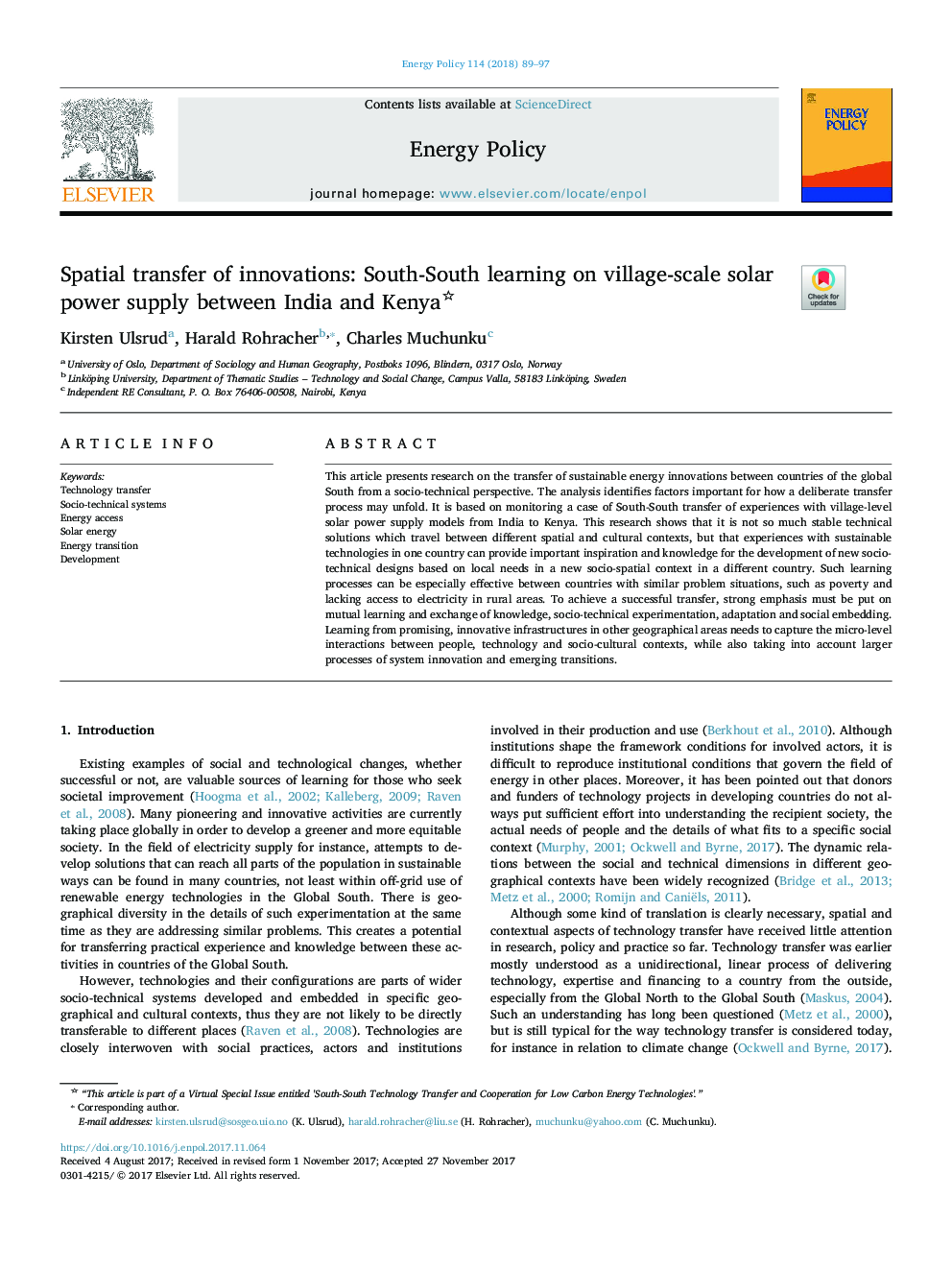| کد مقاله | کد نشریه | سال انتشار | مقاله انگلیسی | نسخه تمام متن |
|---|---|---|---|---|
| 7397625 | 1481244 | 2018 | 9 صفحه PDF | دانلود رایگان |
عنوان انگلیسی مقاله ISI
Spatial transfer of innovations: South-South learning on village-scale solar power supply between India and Kenya
ترجمه فارسی عنوان
انتقال فضایی نوآوری: آموزش جنوب و جنوب در زمینه تامین انرژی خورشیدی در میان روستا بین هند و کنیا
دانلود مقاله + سفارش ترجمه
دانلود مقاله ISI انگلیسی
رایگان برای ایرانیان
کلمات کلیدی
انتقال فناوری، سیستم های اجتماعی و فنی دسترسی به انرژی، انرژی خورشیدی، انتقال انرژی، توسعه،
ترجمه چکیده
این مقاله تحقیقاتی در مورد انتقال نوآوری های انرژی پایدار بین کشورهای جنوب جنوب از یک دیدگاه اجتماعی و فنی ارائه می دهد. تجزیه و تحلیل شناسایی عوامل مهم برای نحوه فرآیند انتقال عمدی ممکن است. این بر مبنای نظارت بر پرونده انتقال جنوب از جنوب به تجارب با مدل های خورشیدی انرژی خورشیدی از هند تا کنیا است. این تحقیق نشان می دهد که راه حل های فنی بسیار پایدار نیستند که بین زمینه های مختلف فضایی و فرهنگی سفر می کنند، اما تجربیات با فن آوری های پایدار در یک کشور می تواند الهام بخش و دانش برای توسعه طرح های جدید اجتماعی و فنی مبتنی بر نیازهای محلی باشد. یک زمینه اجتماعی-فضایی جدید در یک کشور دیگر. چنین فرآیندهای یادگیری می تواند به ویژه در بین کشورهای دارای موقعیت های مشابه مشکل مانند فقر و عدم دسترسی به برق در مناطق روستایی موثر باشد. برای دستیابی به موفقیت موفقیت آمیز، باید بر یادگیری متقابل و تبادل دانش، آزمایش های اجتماعی-فنی، سازگاری و تعبیه اجتماعی قرار گیرد. یادگیری از نویدبخش، زیرساخت های نوآورانه در دیگر مناطق جغرافیایی، نیاز به تداخل سطح میان افراد، فن آوری و شرایط اجتماعی-فرهنگی دارد، در عین حال با در نظر گرفتن فرآیندهای بزرگتر نوآوری سیستم و تغییرات در حال ظهور.
موضوعات مرتبط
مهندسی و علوم پایه
مهندسی انرژی
مهندسی انرژی و فناوری های برق
چکیده انگلیسی
This article presents research on the transfer of sustainable energy innovations between countries of the global South from a socio-technical perspective. The analysis identifies factors important for how a deliberate transfer process may unfold. It is based on monitoring a case of South-South transfer of experiences with village-level solar power supply models from India to Kenya. This research shows that it is not so much stable technical solutions which travel between different spatial and cultural contexts, but that experiences with sustainable technologies in one country can provide important inspiration and knowledge for the development of new socio-technical designs based on local needs in a new socio-spatial context in a different country. Such learning processes can be especially effective between countries with similar problem situations, such as poverty and lacking access to electricity in rural areas. To achieve a successful transfer, strong emphasis must be put on mutual learning and exchange of knowledge, socio-technical experimentation, adaptation and social embedding. Learning from promising, innovative infrastructures in other geographical areas needs to capture the micro-level interactions between people, technology and socio-cultural contexts, while also taking into account larger processes of system innovation and emerging transitions.
ناشر
Database: Elsevier - ScienceDirect (ساینس دایرکت)
Journal: Energy Policy - Volume 114, March 2018, Pages 89-97
Journal: Energy Policy - Volume 114, March 2018, Pages 89-97
نویسندگان
Kirsten Ulsrud, Harald Rohracher, Charles Muchunku,
